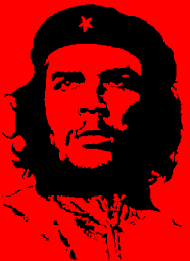CSPE Links
 Timor
Timor
 Cuba
Cuba
 Global Warming
Global Warming Africa I
Africa I  Argentina
Argentina  The Courts
The Courts  US Presidency
US Presidency  ASTI Strike
ASTI Strike  Attack
on America
Attack
on America
In the mountains they were aided by peasants and farmers until their forces grew into a revolutionary army. On 1 January 1959 this army defeated Batista who fled the country.

Che Guevara was born in Argentina on 14 June 1928. He was 10 months younger than Fidel Castro. Che studied medicine at Buenos Aires (capital of Argentina) University where he also become involved in opposition to the Argentine leader, Juan Peron. Che was an intellectual and idealist who read the works of Aristotle, Kant and Marx and had a love of poetry and literature. He had a great sensitivity to injustice in the world, especially the imperialism of the American government.
He suffered from a life-long asthmatic condition that would have prevented almost any other man from participating in guerrilla warfare as he did, but he was determined to not let his ailment interfere with his ideals for a just society.
Later he went to Guatemala where in 1953 he joined the government. The government was overthrown in a coup and Che fled to Mexico. In early July, 1954, he met Fidel Castro. After talking through the night for 10 straight hours he joined the Cuban revolution. Che became the official doctor of the rebel army.

Che Guevara and Fidel Castro left for Cuba in a ship called the Granma. Upon landing in Cuba most of the 81 men in their army were caught or killed. Sixteen of them were able to escape into the Sierra Maestra mountains. In the mountains they were aided by peasants and farmers until their forces grew into a revolutionary army. On 1 January 1959 this army defeated Batista who fled the country. Che had become very popular with the Cuban population who shared many stories of his bravery and leadership. He was considered one of the most important figures in the Revolution.
Che took on many important jobs in the Cuban government. After the Revolution he was minister for Industry from 1961 to 1965. However, his relationship with Castro deteriorated. They disagreed on many aspects of policy.
Che eventually took off to the Congo with 120 Cubans to fight another battle. The mission ended in failure. In 1966 he went to fight for the revolution in Bolivia. He was captured by the Bolivian Army and executed on 9 October 1967.


Castro

Guevara

Elian